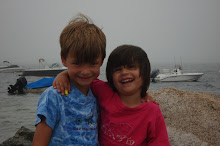I love the structure of the story. The opening narration begins fifteen years after the events of the story, which are narrated as a series of memories by an unnamed but successful writer. (One is to assume this to be Capote himself at first, I guess, although not really--I'm sure his alter-ego is Holly herself.) This writer goes back to the old neighborhood, and then flashes back on the time he was a neighbor to Holly. This makes up the bulk of the story. I found this annoying at first, this structure, but when we meet Holly Golightly and she's, frankly, despicable, it's useful to already feel the yearning that the main character and all the other men in the story still have for her. People who love the movie know all this, but I've never seen the movie. I tried to watch it after reading this story and couldn't get through a single scene.
Here's the narrator's first look at Holly:
I went out into the hall and leaned over the banister, just enough to see without being seen. She was still on the stairs, now she reached the landing, and the ragbag colors of her boy's hair, tawny streaks, strands of albino-blond and yellow, caught the hall light. It was a warm evening, nearly summer, and she wore a slim cool black dress, black sandals, a pearl choker. For all her chic thinness, she had an almost breakfast-cereal air of health, a soap and lemon cleanness, a rough pink darkening in the cheeks. Her mouth was large, her nose upturned. A pair of dark glasses blotted out her eyes. It was a face beyond childhood, yet this side of belonging to a woman. I thought her anywhere between sixteen and thirty; as it turned out, she was shy two months of her nineteenth birthday.
What's notable in the story is the lack of moral judgement on anyone. This narrator seems to have no opinions, just observations. Later in the book, we get a look at her face again, while she sits in a hospital bed and contemplates opening a letter that she knows contains bad news:
The instant she saw the letter she squinted her eyes and bent her lips in a tough tiny smile that advanced her age immeasurably. "Darling," she instructed me, "would you reach in the drawer there and give me my purse. A girl doesn't read this sort of thing without her lipstick."
Guided by a compact mirror, she powdered, painted every vestige of twelve-year-old out of her face. She shaped her lips with one tube, colored her cheeks from another. She penciled the rims of her eyes, blued the lids, sprinkled her neck with 4711; attached pearls to her ears and donned her dark glasses; thus armored, and after a displeased appraisal of her manicure's shabby condition, she ripped open the letter and let her eyes race through it while her stony small smile grew smaller and harder. Eventually she asked for a Picayune. Took a puff: "Tastes bum. But divine," she said and, tossing me the letter: "Maybe this will come in handy--if you ever write a rat-romance. Don't be hoggy: read it aloud. I'd like to hear it myself."
I love the dialog in this, and the descriptions and the party scenes, the action. And the completely weird, but totally believable characters. I love all of it. It is worth reading two nights in a row.






No comments:
Post a Comment